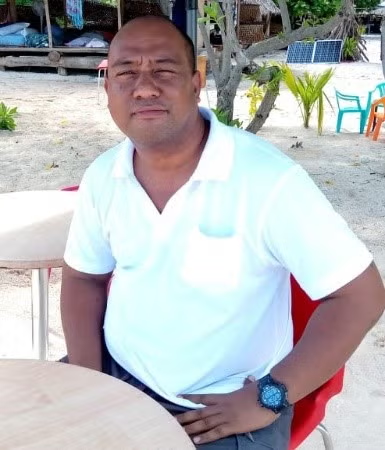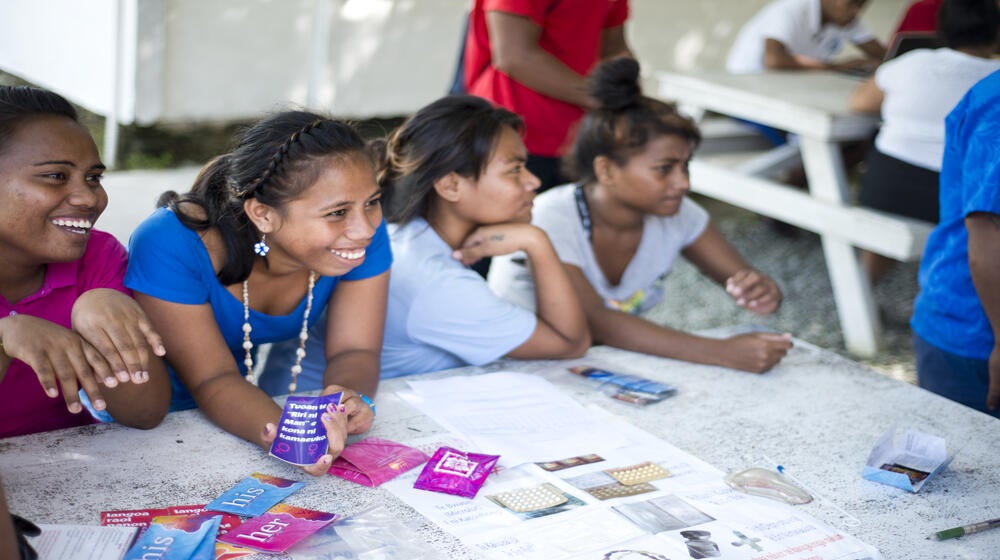When she turned 16, Livia* was like any other young woman drawn by new feelings to explore physical intimacy with her boyfriend. But, also like many youths in the Pacific, Livia had limited access to information or education that could help her make informed decisions about relationships and sex. She became pregnant and delivered her baby at 17.
In the Pacific sub-region, adolescent birth rate for 6 of the 14 countries and territories supported by UNFPA sits above the global average of 44 per 1000 girls, varying between 51 per 1000 girls in Kiribati, to 94 per 1000 girls in Nauru (1). Many of these pregnancies are unintended.
The pubertal changes and the interest in romantic relationships, experienced by adolescents are exciting, but can also be confusing to them. This transition to adulthood requires that adolescents learn knowledge, skills, and attitudes that empower them to make informed decisions about their sexual and reproductive health and wellbeing, and that result in the development of respectful relationships.
But the reality is that it is difficult for adolescents and youth in the Pacific to access accurate sexual and reproductive information and services for various reasons. A lack of understanding of the sexual and reproductive needs of adolescents and taboo are a few of the reasons for this.
The International Planned Parenthood Federation Sub-Regional Office for the Pacific (IPPF-SROP) and the United Nations Population Fund (UNFPA) Pacific recently carried out a study on Out of School Comprehensive Sexuality Education (CSE) in the Pacific. The report demonstrates that six out of ten surveyed young people had received some sexual and reproductive health information, mostly on the potential negative aftermath of drugs (addiction) and sex (HIV, sexually transmitted infections, unplanned pregnancy). Few received information and tools on how to build healthy relationships and protect themselves. For example, one in four surveyed young people received information on contraception. One participant in the study reflected on the challenges that adolescents face to accessing information and learning about sexual and reproductive health.
“In an ideal world, the subject of sexual and reproductive health would be open and more in-depth and we would know more. We’d grow up with healthy relationships around us, and would learn in our environment and our community.”
UNFPA recognizes both the importance of equipping adolescents and youth with the tools to navigate life-changing decisions about their sexual and reproductive health, and the related need to pursue healthy lives and relationships. To address this UNFPA has developed the Transformative Agenda programme. With funding from the Australian Department of Foreign Affairs and Trade (DFAT), UNFPA collaborates with the governments of Fiji, Kiribati, Samoa, Solomon Islands, Tonga and Vanuatu to integrate Comprehensive Sexuality Education into national school systems and into community led programmes targeting adolescents and youth (3).
UNFPA Pacific Representative and Director, Dr. Jennifer Butler, explains: “Empowering adolescents and youth with the right set of information, knowledge, and skills to make informed decisions regarding their sexuality, and nurturing positive values and norms towards their health and social well-being, are key components for ensuring the sustenance of our societies and fulfilling their potential”.
Family Planning New South Wales Australia and IPPF- SROP also support countries in this programme by ensuring that CSE meets international standards and by ensuring that teachers and trainers have the support they need to deliver CSE for youth both in school and out of school.
Teachers as sources of critical information
Teachers play a vital role in how youth develop through adolescence and often serve as primary sources of information on sexual and reproductive health. In a recent survey on delivery of HIV and sexual and reproductive health education in school settings in four Pacific countries, by UNESCO shows how many teachers do not feel supported in addressing sexuality

“Teachers know the content inside and out, however thelack the relevant and appropriate teaching strategies on how to effectively impart the content to students as normal and interesting topics”, says Aberaam Tebitaki, a Senior Associate Lecturer at the Kiribati Teachers College.
Under the Transformative Agenda, UNFPA has trained Mr. Tebitaki and 20 other associate lecturers and curriculum development officers in Kiribati to become Master Trainers on Comprehensive Sexuality Education. They will then train junior secondary (Years 7-9) and senior secondary (Years 10-12) school teachers throughout Kiribati, through applying a Continuous Professional Development approach, which is used for improving teacher competencies. In 2021 alone, the Master Trainers have already trained 82 teachers, and have already seen differences in the delivery of the curriculum.
Mr. Tebitaki shares one of his experiences, “One teacher was able to deliver this sensitive topic in such a relaxed manner. More interestingly, her students were active and engaged, with lots of curiosity in the topic.". Her students, even the boys, bombarded her with deep questions related to menstrual cycle and ovulation. And the teacher demonstrated confidence handling those questions. Her students looked satisfied with the responses. I was very excited to see this happening in the school and I can’t wait to see changes in future!”
This promising anecdote is indicative of the positive impact that informed teaching strategies can have for sexual and reproductive health information and education.
Under the Transformative Agenda, CSE delivered by these trained teachers is having success in providing youth like Livia with the tools to prevent them making uninformed choices that affect their opportunities, health, and wellbeing.
The Transformative Agenda
The Transformative Agenda programme is a AUD $30 million investment by the Government of Australia’s Department of Foreign Affairs and Trade implemented by UNFPA. The programme seeks to reduce the unmet need for family planning over a 51-month period (2018-2022) in six priority countries: Fiji, Kiribati, Samoa, Solomon Islands, Tonga, and Vanuatu. The programme has three focuses areas 1) increasing the supply of family planning information and services, 2) generating demand among the public for family planning information and services, and 3) creating a more conducive environment for people to access family planning information and services. The Comprehensive Sexuality Education intervention falls under the second focus area.
*Name changed to protect privacy.
1. Kiribati National Statistics Office (2019). Kiribati Social Development Indicator Survey 2018-19
Survey Findings Report; Nauru: Bureau of Statistics and Department of Health (2015). Nauru Vital Statistics Report 2008-2013.
2. Comprehensive Sexuality Education is also known as Family Life Education in the Pacific region
3. UNESCO (2015). "Attitudinal Survey Report on the Delivery of HIV and Sexual and Reproductive Health Education in School Settings in Nauru, Niue, Palau and Samoa"


